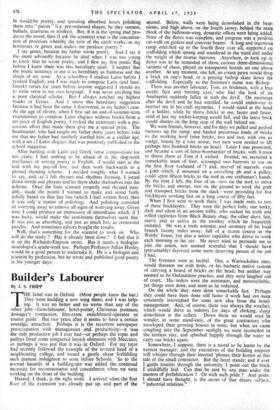Builder's Labourer
By J. S. FRIPP THE hotel was in Oxford. (Most people knew the bar.) They were building a new wing there; and I was help- ing. It was no better and no worse than any of the other jobs—farm-labourer, hotel-porter, Christmas postman, dowager's companion, film-extra, switchboard-operator or tourist guide. But two years after it seems to have a certain nostalgic attraction. Perhaps it is the recurrent newspaper preoccupation with management and productivity—it was the only productive job I ever had—or perhaps the ropes and pulleys freed some conquered boyish obsession with Meccano; or perhaps it was just that it was in Oxford. For my tutor had recently followed the example of the revered head of a neighbouring college, and issued a gentle ukase forbidding such manual indulgence so soon before Schools. So to the normal hazards of a building-site was added the continual necessity for reconnaissance and concealment when we were working on the front of the building. Hazard, I think, is the right word. I arrived when the first floor of the extension was already put up. and part of the second. Below, walls were being demolished in the base- ments, and high above, on the fourth storey, behind the main block of the ballroom-wing, domestic offices were being added. None of the floors was complete, and progress was a perilous cat-walk on girders and concrete beams. A long and ingenious ramp stretched up to the fourth floor over all, supported on scaffolding which sprang and wandered in the -wind and under the weight of the mortar barrows. Anywhere, to look up or down was to be reminded of those curious three-dimensional variants of chess, played on transparent boards set one above another. At any moment, one felt, an errant pawn would drop a brick on one's head, or a preying bishop skate down the scaffolding. Especially as the foreman's name was Bishop. There was another labourer, Tom, an Irishman, with a lean ascetic face and burning eyes, who had the look of an Anabaptist suddenly fallen in with the devil. On mornings after the devil and he had wrestled, he would endeavour to instruct me in his craft mysteries. I would stand at the -head of a ladder, while he threw bricks at me, faster and faster, until at last my wicket-keeping would fail, and the latest brick would shatter on the long stop of the wall behind me.
We were friends, however, and for days we pulled and pushed barrows up the ramp, and hauled precarious loads of bricks to the working level (nine bricks, two and two, with one as wedge, bound by a wire noose; two men were needed to lift perhaps two hundred bricks an hour). Later I was promoted, and became a sort of lance-bombardier of bricks, with licence to throw them at Tom if I wished. Instead, we recruited a remarkable team of four, scrounged two barrows to use on the first floor (unheard of !) and, marvel of marvels, even a grab which, if mounted on a swivelling jib and a pulley, could spirit fifteen bricks to the roof in one craftsman's hands. By the time I left, the four of us—two on the roof, to move the bras and mortar, two on the ground to work the grab and transport bricks from the stack—were providing for five bricklayers working fast on a long course of fifty feet.
When I first went to work there, I was made mate to two of these bricklayers. They were the perfect foils; one lanky, dark and silent in an ancient trilby, who sucked his teeth and rolled cigarettes from Black Beauty shag; the other short, fair, merry and as active as the monkey which he frequently imitated. He was a trade unionist, and secretary of his local branch twenty miles away; full of a recent course at the Webbs' house, but also a minor capitalist who drove to work each morning in his car. He never tried to persuade me to join the union, nor seemed resentful that I should have (presumably) deprived some more deserving person of the job I had.
The foremen were as tactful. One, a Warwickshire man, would threaten me with hods, or his barbaric native custom of carrying a board of bricks on the head; but neither way seemed to be Oxfordshire practice, and they were laughed out of court. His orders were the minimum, and monosyllabic; yet things were done, and most as he ordained.
On the whole they were done remarkably fast. Perhaps they could have been done still faster if work had not been constantly interrupted for some new idea from the hotel- management. And, of course, there was always the weather, which would drive us indoors for days of choking, dugy demolition in the cellars. Down there we would read In wonder, in some stand-easy, of the great contractors who enveloped their growing houses in tents; but when we came coughing into the September sunlight we were reconciled to the tentless stay, and splashed happily through the water to carry our bricks again.
Somewhere, I suppose, there is a moral to be learnt by the earnest manager; and the executives of the building empires will whisper through their internal 'phones their horror at this tale of the small contractor. But the hotel stands; and if ever I guide tourists through the university I point out the brick I unskilfully laid. Can that be said by any man under the masters of prefabrication ? Or with such pride ? And pride, I should have thought, is the secret ofthat dreary subject. " industrial relations.'


































 Previous page
Previous page